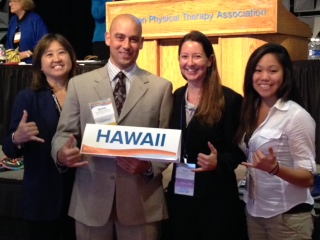Posted on November 11, 2014 by Chapter Staff
Originally Published in HAPTA’s e-Newsletter, What’s HAPTAnin’ – November 2014
In June Jeremy Angaran and Carri Dominick represented HAPTA at the 2014 APTA house of delegates in Charlotte, NC. Jill Wakabayashi represented our PTAs as HAPTA’s PTA caucus representative and HAPTA sponsored a student usher Keline Yoshimura who is in her final year of PT school at Marquette University. A few of the motions that were voted upon and adopted this year include:
- APTA shall begin to pursue a uniform change in the regulatory designation of physical therapists in all states to “DPT” by the year 2025
- APTA will create a plan for increasing the value of APTA membership for the physical therapist assistant (PTA) and present the plan to the 2015 House of Delegates by December 2014
- APTA will, in collaboration with relevant stakeholders, will identify best practice for physical therapist clinical education, from professional level through postgraduate clinical training, with a report to the 2017 House of Delegates
- APTA will explore new and innovative ways to increase membership recruitment and retention of early career individuals with a report to the 2016 House.
- APTA will identify and develop resources that equip PTs and PTAs to negotiate successfully in establishing an agreed upon conceptual framework of productivity and performance to ensure the provision of quality physical therapy care with a report to the 2015 House of Delegates
- Created a position that the APTA supports consumer access to mobility status certification by inclusion of physical therapists as able to make such determinations
These are a few of the motions adopted that have the most impact on us. APTA is looking at ways of being more valuable to the PTA and more affordable to new graduates. They are also looking at creating a best practice model for education which may include residencies and fellowships. Hawaii every so often considers starting a PT school here locally and this could have an impact on any future decisions to bring a PT school here.
Another big issue for most clinicians is productivity standards and APTA is committed to exploring and establishing reasonable productivity standards in order to maintain quality care of patients.
Also, APTA supports PTs as practitioners who can make mobility status determinations, such as for handicap placards for vehicles.
Remember, these are positions by the APTA and not state law, however many states look to the APTA for recommendations and support of state laws and practice acts.
Thank you for this opportunity to serve you as the HAPTA chief delegate.
Carri Dominick, PT, DPT, CSCS



Leave A Comment